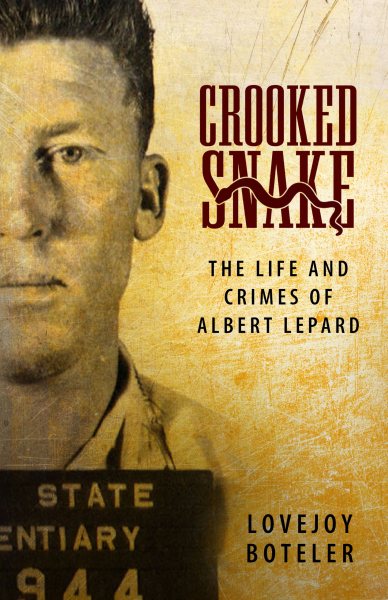Interview by Jana Hoops. Special to the Clarion-Ledger Sunday print edition (March 31)
Fifty years have gone by since Lovejoy Boteler, then 18, was abducted from his family’s farm near Grenada by two escaped convicts serving time at Parchman Penitentiary for murder.
 In his first book, Crooked Snake: The Life and Crimes of Albert Lepard (University Press of Mississippi), Boteler chronicles his decision two decades ago to get on the road and dig into the background of his kidnapper, in a quest to find some answers about what happened on that fateful June day.
In his first book, Crooked Snake: The Life and Crimes of Albert Lepard (University Press of Mississippi), Boteler chronicles his decision two decades ago to get on the road and dig into the background of his kidnapper, in a quest to find some answers about what happened on that fateful June day.
His journey resulted in more than 70 personal interviews with family members, law officers and ex-convicts who ran with Lepard, along with unearthing numerous historical records that helped piece together the story of the short and violent life of this poverty-stricken, illiterate killer.
During his 14 years of incarceration for the murder of his 74-year-old great aunt in 1959, Lepard would escape six times. Born in 1934 in rural Attala County, his life would end with a bullet in his chest 40 years later, during a smalltime robbery.
Boteler went on to finish college, have a family, and enjoy some colorful career turns (including stints as a deck hand on the Mississippi River and a rodeo hand in Colorado), along with clerking for the Mississippi Legislature and teaching construction technology and instrumental music in public schools. Today he enjoys building custom furniture.
You were kidnapped in 1968 at age 18 by Albert Lepard, an escaped convict from Parchman Penitentiary, who was serving time for murder charges. After contemplating the shock of this life-changing event for more than three decades, you finally decided to go in search of information about your kidnapper. Why at this time did you feel like you were ready to tackle this project?

Lovejoy Boteler
Actually, my wife said I should–must–write the story of my kidnapping, if for no other reason than to pass it down to our children. She has heard me tell the story to other folks at least a hundred times! So, the ‘spark was struck’ and I began remembering the events of that strange day, first through the old scrapbook my mother made of the newspaper articles, photos and the mysterious silver dollars left by the convicts in the glove box of the truck. Then through some basic archival research, one thing turned up another, and another, and ultimately, I discovered the life and crimes of the notorious prison escape artist, Lepard.
In your search for information about Lepard’s background, you found that he had grown up poor and illiterate, with an alcoholic father, and a mother he loved dearly but who died when he was only 13. Did any of this affect your feelings about him, and if so, how?
Discovering that Lepard had committed a brutal torch-murder of his elderly aunt certainly did nothing to endear him to me. In fact, it gave me an overwhelming sense of disgust, revulsion. However, as I gained a gradual understanding of his childhood circumstances–grinding poverty, physical cruelty, and crushing hopelessness–I began to feel sort of ambivalent about him, and that made me think in depth about the complexity of human nature, and specifically that of forgiveness.
Lepard broke out of Parchman Penitentiary six times during his incarceration there from 1959 to 1974. He had been charged with the spectacularly brutal murder of Mary Young. Can you tell us briefly how that came about?
Lepard and his cousin committed the ghastly murder of their great-aunt in an instance of berserk greed and near insanity. Both were captured, tried, and sentenced to life in prison at Parchman Penitentiary, and while his cousin Joe did “good time” and was paroled after 10 years, Lepard just couldn’t make himself do the time. He bolted every chance he got, and abducted me on his fifth, next-to-last, escape from Parchman.
Crooked Snake: The Life and Crimes of Albert Lepard reveals that although Lepard had a violent nature, he lived by his own code of morality that ensured he would keep his word to someone, no matter what. What examples proved this side of his nature and what do you make of that?
The Lepard relatives that I interviewed always said that he was a ‘good boy’ when he was young and stayed close to home and hearth. Obviously, his life took a downward turn as an adult, but he displayed a loyalty to those he admired, or those who showed a certain respect for him. In a robbery, he would sometimes give an unlucky victim a few dollars back, if he felt they were the ‘under-dog.’ If he stole food or clothes from other poor folks, he might leave money for them to find later. He felt honor-bound to return from one of his escapes with weapons he had promised for certain Parchman inmates. I’ve wondered if he ever heard of Robin Hood, but thought probably not, given his illiteracy.
In what ways have you carried the fear of this assault with you through the years, and did researching and writing this book help you deal with those feelings?
Truthfully, I have not carried “fear” with me since the summer of 1968. Yes, the events of my kidnapping left indelible memories of that day, and I was shaken up for a while, but remember, I was an 18-year-old boy and the possibilities of life in the future soon brought back the youthful feeling of being invincible.
Talking to the 70 extraordinary people who make up the larger portion of the book–lawmen, ex-convicts, family members, and other victims just like me–helped me bring my own story full circle and allowed me a sense of closure on an eccentric slice of history.
Signed copies of Crooked Snakes: The Life and Crimes of Albert Lepard are still available at Lemuria’s online store.


Comments are closed.